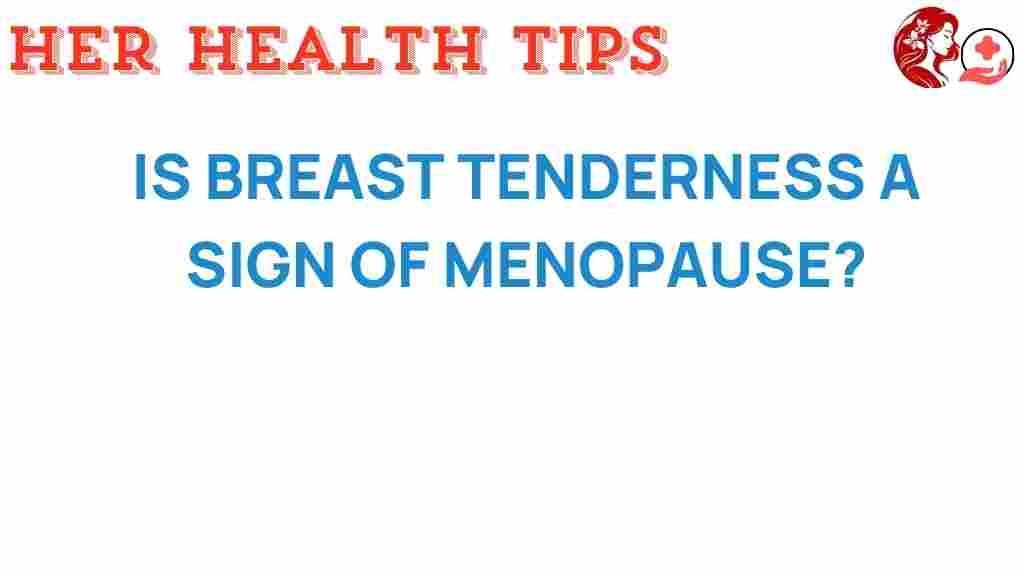Is Breast Tenderness a Hidden Sign of Menopause?
Breast tenderness is a common experience for many women, often linked to the menstrual cycle, pregnancy, or hormonal fluctuations. However, as women age, particularly during the perimenopausal and menopausal phases, breast tenderness can take on new implications. This article explores the connection between breast tenderness and menopause symptoms, shedding light on how hormonal changes may signal age-related changes in women’s health.
Understanding Breast Tenderness
Breast tenderness, medically known as mastalgia, can vary in intensity and duration. It may be cyclical, occurring in relation to menstrual cycles, or non-cyclical, happening without any correlation to menstrual hormones. Various factors can contribute to breast tenderness, including:
- Hormonal fluctuations
- Dietary changes
- Stress levels
- Medications
- Breast conditions
How Hormonal Changes Affect Breast Health
As women approach menopause, their bodies undergo significant hormonal changes. The primary hormones involved are estrogen and progesterone, which regulate various functions, including breast health. Here’s how these hormonal changes may lead to breast tenderness:
- Estrogen Levels: Fluctuations in estrogen can cause the breast tissue to swell and become tender.
- Progesterone: Increased progesterone levels in the luteal phase of the cycle can also lead to breast sensitivity.
- Declining Hormones: As menopause approaches, estrogen levels decline, leading to changes in breast tissue composition, which may cause discomfort.
Recognizing Menopause Symptoms
Menopause is marked by the end of menstrual cycles and is typically diagnosed after 12 consecutive months without a period. The transition to this stage, known as perimenopause, can begin years earlier and is associated with various menopause symptoms, including:
- Hot flashes
- Night sweats
- Irregular periods
- Sleep disturbances
- Mood swings
- Vaginal dryness
- Breast tenderness
Breast tenderness, while not always a primary symptom, can be a hidden sign of the hormonal changes associated with menopause. It is essential for women to be aware of how these changes can manifest in their bodies.
Age-Related Changes in Women’s Health
As women age, their bodies naturally undergo changes that can affect their overall health, including breast health. These age-related changes may include:
- Decrease in breast density
- Changes in breast tissue composition
- Increased risk of breast conditions
Being informed about these changes is crucial for health awareness and proactive management of women’s health. Regular breast self-exams and mammograms are important for monitoring breast health and catching potential issues early.
Step-by-Step Process: Managing Breast Tenderness During Menopause
If you are experiencing breast tenderness and suspect it may be related to menopause, consider the following step-by-step approach:
- Track Your Symptoms: Keep a journal of your breast tenderness, noting when it occurs, its intensity, and any accompanying symptoms. This information can be helpful for healthcare providers.
- Consult a Healthcare Provider: Schedule an appointment to discuss your symptoms. A healthcare provider can help determine if your breast tenderness is related to menopause or another condition.
- Explore Treatment Options: Based on your symptoms, your healthcare provider may suggest lifestyle changes, dietary adjustments, or hormonal therapies to alleviate discomfort.
- Implement Lifestyle Changes: Consider incorporating regular exercise, a balanced diet, and stress-reduction techniques, such as meditation or yoga, to help manage symptoms.
- Regular Check-Ups: Continue with regular health check-ups and breast screenings as recommended to monitor your breast health.
Troubleshooting Tips for Breast Tenderness
If you are dealing with breast tenderness, here are some troubleshooting tips that may help alleviate discomfort:
- Wear supportive bras to reduce movement and pressure on tender breasts.
- Apply warm or cold compresses to the breasts to soothe pain.
- Limit caffeine and high-fat foods, which may exacerbate tenderness.
- Stay hydrated and maintain a healthy diet rich in fruits, vegetables, and whole grains.
- Practice stress management techniques to help balance hormonal fluctuations.
While breast tenderness can be a normal part of the aging process, it’s important to remain vigilant about changes in your breast health. If the tenderness persists or is accompanied by other symptoms such as lumps, discharge, or severe pain, be sure to consult a healthcare professional.
Conclusion
In conclusion, breast tenderness can indeed be a hidden sign of menopause, reflecting the hormonal changes that accompany this natural stage of life. Understanding the connection between breast tenderness and menopause symptoms is vital for women to manage their health effectively. By staying informed and proactive about age-related changes and breast health, women can navigate this transition with greater awareness and confidence.
If you’re looking for more information on women’s health and menopause, consider visiting this resource for additional support and guidance.
Remember, prioritizing health awareness and regular check-ups is key to maintaining overall well-being during this transformative period of life.
This article is in the category Reproductive and created by HerHealthTips Team
